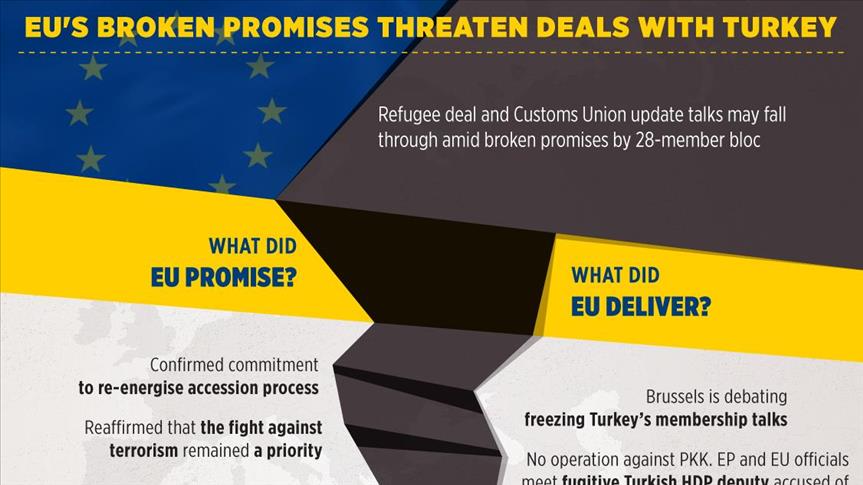
BRUSSELS
The EU-Turkey refugee deal and Customs Union update talks may collapse amid promises broken by the 28-member bloc.

Turkey and the EU signed a refugee deal in March, which aimed to discourage irregular migration through the Aegean Sea by taking stricter measures against human traffickers and improving the conditions of nearly three million Syrian refugees in Turkey.
The March 18 deal also allowed for the acceleration of Turkey’s EU membership bid and visa-free travel for Turkish nationals within the Schengen area.
In a joint statement dated Nov. 29, 2015, the EU and Turkey had confirmed their commitment to re-energise the accession process. Turkey formally applied to become an EU member in 1987, while accession talks began in 2005.
However, almost a year later, on Nov. 24, the European Parliament approved a non-binding motion to freeze EU-membership talks with Turkey, in response to post-coup investigations and recent developments in the country including measures taken within the framework of the fight against the PKK and FETO terrorist groups.
The EU countries' leaders also decided to evaluate relations with Turkey at the EU summit in December.
The PKK -- listed as a terrorist organization by Turkey, the U.S., and EU -- resumed its decades-old armed campaign in July last year. Since then, more than 300 civilians and nearly 800 security personnel have been martyred. Around 8,000 PKK terrorists have been killed or apprehended.
Led by U.S.-based Fetullah Gulen, FETO is accused of orchestrating Turkey’s July 15 coup plot as well as being behind a long-running campaign to overthrow the state through infiltrating Turkish institutions, particularly the military, police, and the judiciary.
The July 15 defeated coup left 248 martyred and nearly 2,200 wounded.
Europe doesn't support Turkey’s fight against terror
Turkey and the EU had reaffirmed in the joint statement that the fight against terrorism remained a priority.
Yet, Brussels has often slammed Turkey over the precautions taken as part of the fight against the PKK and FETO, let alone support its fight against terror.
No operation has been launched against the PKK across Europe although it is listed as a terrorist organization by the EU.
Moreover, on Nov. 16, European Parliament head Martin Schulz and EU Commissioner for European Neighborhood Policy and Enlargement Negotiations Johannes Hahn held a meeting with a fugitive Peoples’ Democratic Party (HDP) deputy -- a move Ankara considers "support for terrorism."
Faysal Sariyildiz is one of 15 HDP deputies for whom arrest warrants on terror-related charges were issued earlier this month.
Sariyildiz failed to appear to testify in a terrorism investigation in Turkey and there is also video footage allegedly showing him transporting weapons for PKK terrorists.
Customs Union update talks
In the statement, Turkey and the EU also "took note of the launching of preparatory steps for upgrading the Customs Union."
"After completion of this preparatory work by both sides, formal negotiations could be launched towards the end of 2016," the statement said.
However, no concrete steps have been taken so far.
The Customs Union agreement was established in 1995.
1,614 out of 72,000 refugees resettled in EU
So far, 1,614 Syrian refugees have been resettled from Turkey to Europe while 578 irregular migrants have been returned from the Greek islands to Turkey, according to the European Commission.
Europe had agreed to take 72,000.
EU also failed to deliver a promised 3 billion euros ($3.2 billion) in aid that has been pledged for over 3 million refugees living in Turkey.
Turkey will also receive an additional 3 billion euros, agreed upon in a refugee deal with the EU, throughout the next two years until 2018, the then PM Ahmet Davutoglu said in March.
However, Turkey has so far received only 677 million euros ($716 million).
Turkey is hosting the largest number of Syrian refugees in the world, and has so far spent more than $12 billion on the refugees.
Visa-free travel still uncertain
In the joint statement, Turkey and EU had also agreed to lift visa requirements for Turkish citizens in the Schengen zone by October 2016 on the condition that Ankara meets 72 requirements set by the EU.
Ankara has met most of the requirements, but the EU’s demands for change in Turkey’s anti-terrorism law have led to a deadlock in negotiations.
Anadolu Agency website contains only a portion of the news stories offered to subscribers in the AA News Broadcasting System (HAS), and in summarized form. Please contact us for subscription options.







